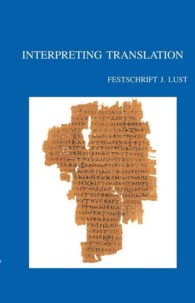Full Description
The use of literary texts in language classrooms is firmly established, but new questions arise with the transfer to remote teaching and learning. How do we teach literature online? How do learners react to being taught literature online? Will new genres emerge from the COVID-19 pandemic? Is the literary canon changing?
This volume celebrates the vitality of literary and pedagogic responses to the pandemic and presents research into the phenomena observed in this evolving field. One strand of the book discusses literary outputs stimulated by the pandemic as well as past pandemics. Another strand looks at the pedagogy of engaging learners with literature online, examining learners of different ages and of different proficiency levels and different educational backgrounds, including teacher education. Finally, a third strand looks at the affordances of various technologies for teaching online and the way they interact with literature and with language learning. The contributions in this volume take literature teaching online away from static lecturing strategies, present numerous options for online teaching, and provide research-based grounding for the implementation of these pedagogies.
Contents
Introduction, Amos Paran (Institute of Education, University College London, UK) and Sandra Stadler-Heer (Catholic University Eichstätt-Ingolstadt, Germany)
Part I: Literary Responses in Times of Crisis
1. Literary Narratives as Recordings of the Pandemic Present: The New York Times Magazine's Decameron Project, Ingrid Gessner (University College of Teacher Education Vorarlberg, Austria)
2. Pandemic Literature: What It Is, Why It Should Be Taught and How, Engelbert Thaler (University of Augsburg, Germany)
II. Researching and Teaching Literature for/to Young Learners
3. Identifying Quality in Asynchronous, Pre-recorded Picturebook Read-Alouds for Children Learning English as a Foreign Language, Gail Ellis (Independent Researcher, France) and Sandie Mourão (Universidade Nova de Lisboa, Portugal)
4. Digital Picturebooks in Times of Crisis: From Picturebooks about the Coronavirus to Developing Critical Environmental Literacies, Theresa Summer (University of Würzburg, Germany)
III. Researching and Teaching Literature in Online Teacher Education
5. Exploiting the Educational Potential of Literature in English Language Teaching: Continuity and Change in Digital Literature Teaching, Christine Gardemann (University of Bielefeld, Germany)
6. Conducting Story-based Activities in Times of Social Distancing, Annett Kaminski (University of Koblenz-Landau, Germany)
IV. Tools and Concepts for Teaching Literature Online
7. Implementing a Collaborative Reading Project Online: Solutions for a Pedagogically Meaningful Virtual Workshop, Jennifer Schumm Fauster (University of Graz, Austria)
8. Digital Storytelling as a Pedagogical Approach for Meaningful Learning: Alternative Implementations of Technology in the Libyan EFL Context, Fatma Abu-Baker (University of Edinburgh, UK) and Hana A. El-Badri (University of Benghazi, Lybia)
9. Simple and Engaging Fiction for Adult Beginners, Pedro Malard Monteiro (Universidade Federal de Uberlandia, Brazil), Margaret Wilkinson (Newcastle University, UK) and Martha Young-Scholten (Newcastle University, UK)
10. Annotating Literary Texts on Conceptboard: Philological Practice in the Digital Classroom, Verena Laschinger (University of Erfurt, Germany)
11. Writing the Future —Collaborative Creative Science-Fiction Writing in the Virtual EFL Classroom, Christian Ludwig and Elizabeth Shipley (University of Karlsruhe, Germany)
Afterword: Closing Reflections on the Brave New World of Literature and Language Education Online, Geoff Hall (University of Nottingham-Ningbo, China)
References








